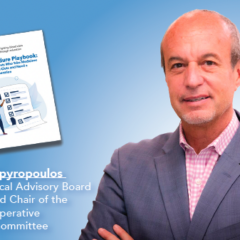Last updated on
A Look Into C-TRACT
Updated October 2019
A Look Into the Chronic Venous Thrombosis: Relief with Adjunctive Catheter-Directed Therapy (C-TRACT) Clinical Trial
Patients who develop deep vein thrombosis (DVT), should receive anticoagulant medications to prevent clots from moving elsewhere in the body or recurring at a later time.
However, even with anticoagulant treatment, about half of patients with DVT wind up with long-term leg problems. This complication, called post-thrombotic syndrome (PTS), typically causes daily leg pain, swelling, heaviness, and fatigue. Some patients with PTS develop permanent skin changes on their leg or experience skin breakdown with open sores (ulcers) that are often slow to heal. People with severe PTS can have difficulty completing normal daily activities and often experience poor quality of life. Currently, there is no consistently effective, evidence-based treatment available for PTS. Common approaches include compression therapy (usually stockings) or medications, but these methods typically don’t provide enough relief to patients.
In recent years, imaging-guided, catheter-based treatments have been used to try to reduce symptom severity in selected patients with PTS. These therapies may involve either the placement of metallic stents to re-open large veins that are blocked by old clots or catheter-based procedures to eliminate valve reflux (backwards blood flow) in the surface veins of the leg. These methods may be helpful for some patients but have never been carefully studied in well-designed clinical trials. Are the potential benefits of these therapies worth the risks and inconvenience for most patients?
The Chronic Venous Thrombosis: Relief with Adjunctive Catheter-Directed Therapy (C-TRACT) clinical trial is an ongoing, multicenter randomized trial evaluating whether catheter-based procedures (known as “endovascular therapy” or “EVT”) reduce PTS severity and improve quality of life in patients with moderate-to-severe PTS. The study is sponsored by the National Heart Lung and Blood Institute (part of the National Institutes of Health) and is led by Dr. Suresh Vedantham at the Washington University School of Medicine in St. Louis, MO, in partnership with other leading doctors.
In this study, all patients who choose to participate will receive close monitoring and optimal standard PTS care that includes medications, compression therapy, and quality venous ulcer care if needed. Half of the patients will be randomly assigned to also undergo EVT procedures. All patients will be followed for 2 years to see which treatment strategy (EVT or no EVT) is most effective in reducing PTS severity, improving quality of life, and healing venous ulcers.
Participation in the C-TRACT study will enable patients to learn about their condition and receive state-of-the-art PTS treatment with close monitoring. It will also create new knowledge that will help providers improve care for future patients. Providers are encouraged to click here to view and download the C-TRACT Referral App, which enables quick referral of potential study patients. Interested physicians can also apply to serve as site investigators. For more information, please visit https://bloodclotstudy.wustl.edu or contact the C-TRACT Clinical Trial Manager, Angela Oliver at 1-866-974-CLOT (2568) or [email protected].



